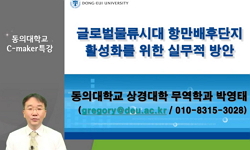Modern society is enriching various content areas day by day, and interest in utilizing leisure time is also increasing. The government's work system has increased the leisure time of office workers and led to evening life. There is also growing inter...
http://chineseinput.net/에서 pinyin(병음)방식으로 중국어를 변환할 수 있습니다.
변환된 중국어를 복사하여 사용하시면 됩니다.
- 中文 을 입력하시려면 zhongwen을 입력하시고 space를누르시면됩니다.
- 北京 을 입력하시려면 beijing을 입력하시고 space를 누르시면 됩니다.
https://www.riss.kr/link?id=A107830433
- 저자
- 발행기관
- 학술지명
- 권호사항
-
발행연도
2021
-
작성언어
Korean
-
주제어
Ceramic Studio ; Cheongju city ; Activation Plan ; 도자공방 ; 청주시 ; 활성화 방안
-
등재정보
KCI등재후보
-
자료형태
학술저널
-
수록면
151-165(15쪽)
-
KCI 피인용횟수
0
- DOI식별코드
- 제공처
- 소장기관
-
0
상세조회 -
0
다운로드
부가정보
다국어 초록 (Multilingual Abstract)
In order to understand the characteristics of Cheongju citizens and the current status of ceramic workshops, the Cheongju Cultural Industry Foundation, and Cheongju Craft Biennale websites and related data collections were collected. Based on this, the government investigated ceramic-related support policy projects in Cheongju City and proposed ways to revitalize the ceramic workshop through in-depth interviews with experts in Cheongju City.
According to the research results, most of the ceramic workshops are operated in a single-person system, so the various roles of education, production, distribution, and sales of the workshops are different.
It was difficult to handle alone. In this regard, it is necessary to facilitate communication with Cheongju-si institutions by expanding various channels of content, distribution, and sales and forming a network between workshops. Also, during the Cheongju Crafts Biennale with visitors to the cultural manufacturing window where the Korean Crafts Museum is located as a way to revitalize pottery workshops, it is necessary to produce promotional materials to guide local residents about the workshop program and encourage them to participate in the Cheongju support policy project.
Modern society is enriching various content areas day by day, and interest in utilizing leisure time is also increasing. The government's work system has increased the leisure time of office workers and led to evening life. There is also growing interest in pottery activities as part of career exploration and emotional stability of students suffering from overheated academic studies and creative brain activity. In the past industrialization era, demand for ceramic products mass-produced in factories was the main reason, but the value of handcrafting is now increasing and demand for ceramic products in workshops is steadily increasing. This study was conducted on Cheongju City to study the status of pottery workshops and ways to revitalize the pottery culture, as ceramic workshops are adjacent to the active areas.
In order to understand the characteristics of Cheongju citizens and the current status of ceramic workshops, the Cheongju Cultural Industry Foundation, and Cheongju Craft Biennale websites and related data collections were collected. Based on this, the government investigated ceramic-related support policy projects in Cheongju City and proposed ways to revitalize the ceramic workshop through in-depth interviews with experts in Cheongju City.
According to the research results, most of the ceramic workshops are operated in a single-person system, so the various roles of education, production, distribution, and sales of the workshops are different.
It was difficult to handle alone. In this regard, it is necessary to facilitate communication with Cheongju-si institutions by expanding various channels of content, distribution, and sales and forming a network between workshops. Also, during the Cheongju Crafts Biennale with visitors to the cultural manufacturing window where the Korean Crafts Museum is located as a way to revitalize pottery workshops, it is necessary to produce promotional materials to guide local residents about the workshop program and encourage them to participate in the Cheongju support policy project.
참고문헌 (Reference)
1 "한국도자재단"
2 "한국공예관 홈페이지"
3 "청주시청 홈페이지"
4 "청주시문화산업진흥재단"
5 "청주공예비엔날레" 2019
6 "세계미술용어사전"
7 "두산백과사전"
8 문 희 수, "도자산업의 유통시장 분석 연구" 한국도자학회 14 (14): 47-63, 2017
9 신경미, "국제비엔날레가 개최지역에 미치는 영향에 관한 연구 : 부산비엔날레를 중심으로" 홍익대학교 미술대학원 2013
10 한국공예, "2019공예산업실태조사" 2020
1 "한국도자재단"
2 "한국공예관 홈페이지"
3 "청주시청 홈페이지"
4 "청주시문화산업진흥재단"
5 "청주공예비엔날레" 2019
6 "세계미술용어사전"
7 "두산백과사전"
8 문 희 수, "도자산업의 유통시장 분석 연구" 한국도자학회 14 (14): 47-63, 2017
9 신경미, "국제비엔날레가 개최지역에 미치는 영향에 관한 연구 : 부산비엔날레를 중심으로" 홍익대학교 미술대학원 2013
10 한국공예, "2019공예산업실태조사" 2020
동일학술지(권/호) 다른 논문
-
- 한국도자학회
- 吴明轩
- 2021
- KCI등재후보
-
- 한국도자학회
- 吳侯建
- 2021
- KCI등재후보
-
하워드 코틀러(Howard Kottler) 작품에 나타난 정치적 사회적 표현에 대한 연구(1966~1972)
- 한국도자학회
- 우관호
- 2021
- KCI등재후보
-
키클라데스 조각 요소가 차용된 현대 도자조형의 표현과 특징연구
- 한국도자학회
- 이춘복
- 2021
- KCI등재후보
분석정보
인용정보 인용지수 설명보기
학술지 이력
| 연월일 | 이력구분 | 이력상세 | 등재구분 |
|---|---|---|---|
| 2022 | 평가예정 | 계속평가 신청대상 (계속평가) | |
| 2020-01-01 | 평가 | 등재후보학술지 선정 (신규평가) |  |
| 2019-12-01 | 평가 | 등재후보 탈락 (계속평가) | |
| 2018-12-01 | 평가 | 등재후보로 하락 (계속평가) |  |
| 2015-01-01 | 평가 | 등재학술지 선정 (계속평가) |  |
| 2013-01-01 | 평가 | 등재후보학술지 유지 (기타) |  |
| 2012-01-01 | 평가 | 등재후보학술지 유지 (기타) |  |
| 2011-01-01 | 평가 | 등재후보 1차 FAIL (등재후보1차) |  |
| 2010-01-01 | 평가 | 등재후보 1차 PASS (등재후보1차) |  |
| 2008-01-01 | 평가 | 등재후보학술지 선정 (신규평가) |  |
학술지 인용정보
| 기준연도 | WOS-KCI 통합IF(2년) | KCIF(2년) | KCIF(3년) |
|---|---|---|---|
| 2016 | 0.07 | 0.07 | 0.09 |
| KCIF(4년) | KCIF(5년) | 중심성지수(3년) | 즉시성지수 |
| 0.13 | 0.13 | 0.283 | 0.16 |





 KCI
KCI 스콜라
스콜라





